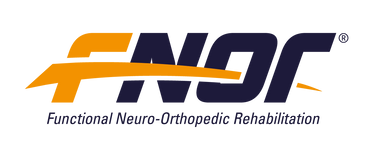FNOR 6: Multimodal Neuro-Orthopedic Strategies for Complex Injury
FNOR VI
Multimodal Neuro-Orthopedic Strategies for Complex Injury
“Persistent and recurrent injury of the body or nervous system can contribute to significant loss of independence, restrictions in social activities and decline in quality of life. Appropriately applied technologies hold tremendous potential to help to reduce long-term consequences of neurologic disease in daily life.”
GENERAL DESCRIPTION
The FNORTM rehabilitative process aims to transform the human nervous system, affording clients the ability to move through injury and pain, especially of the nervous system, toward a higher state of function. The process of driving neuroplasticity can be significantly enhanced by the application of key technologies at pivotal points in the rehabilitation process. This is particularly true within the context of multisystem neurodegenerative disorders (of which we argue that chronic pain should be considered an example.) FNOR 6TMpresents a systematic approach to the clinical integration of current and cutting-edge, clinical modalities directed at body and brain that is driven by advances and emerging concepts in the field of neuroscience. Techniques will be presented within the overall contexts of combating persistent pain, driving multi-dimensional adaptability, enhancing performance and promoting overall wellness.
SOME OF THE CLINICALLY USEFUL CONCEPTS YOU CAN EXPECT TO LEARN FROM THIS COURSE:
- Intensifying therapy within the Neuro-orthopedic paradigm through the application of key modalities (without being tempted by the “everything but the kitchen sink” approach.)
- How to learn from stroke, multiple sclerosis, Alzheimer’s disease, Parkinson’s disease, Concussion and brain injury, and peripheral nerve injury.
- Where does this stand with respect to the evidence?… Being rational and systematic while managing the challenges of a translation clinical science.
- How Pharmaceuticals can mean the difference between helping, risking or hurting during rehabilitation.
- Effective clinical tools and devices utilizing visual, auditory, vestibular and somatosensory systems.
- Coordinating the use of clinical technologies to address nervous system injury, as well as co-occurring physical and psychological manifestations of injury.
WHY (AS A MODERN REHABILITATION SPECIALIST) YOU SHOULD TAKE THIS COURSE:
“Complex body and/or brain injury is frequently associated with degeneration of the sensory, motor and cognitive networks of the brain. Victims of injury (as a result of subsequent central changes) may experience any combination of complex symptoms including subtle tremor, altered voluntary movement, difficulty walking or running, executive function decline, memory problems, social withdrawal… the list is as varied as the breadth of brain function.”
The final course in the foundational, 6-module FNORTM series, FNOR 6TM, completes the FNORTM rehabilitation specialist’s “clinical toolset” with the addition of a range of highly practical modalities and advanced techniques. More than simply presenting techniques this course will instruct a system of integration that is intended to facilitate a more coordinated approach that simplifies the potential complexity associated with managing a complicated, multi-dimensional presentation.
In the application of new techniques and clinical modalities, this course will involve rapid review of the various systems of the CNS, including sensorimotor, cognitive and executive systems, Cerebellum, vestibular system and various reflexive systems.
This course will include a highly-clinically-applicable overview of a number of non-surgical, non-pharmaceutical, non-ablative, innovative therapies cutting-edge and experimental therapies aimed at restoring nervous system function.
UPDATE YOUR PAIN REHABILITATION TOOLBOX WITH…
- FNOR’s Modular, Integrative Approach to Multi-system, Multi-dimensional Therapeutic Approach.
- Innovative Applications in Electro-Analgesia and Neuromodulation.
- Specific Applications of Phono- and Iontophoresis.
- Integration of Peripheral Nerve & Field Stimulation.
- Emerging Techniques & Potential Applications of Transcutaneous Spinal, Transcranial and Transcranial Magnetic Stimulation.
- FNORTM Multi-vector, Responsive, Loading (MVRL)TM Techniques in Rehabilitation.
- Electro-Neuromuscular Stimulation Techniques.
- Advanced Techniques in Spine and Upper- and Lower Quarter Rehabilitation.
- Advanced, FNORTM Neuroadaptive CascadingTM Techniques.
